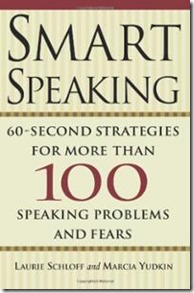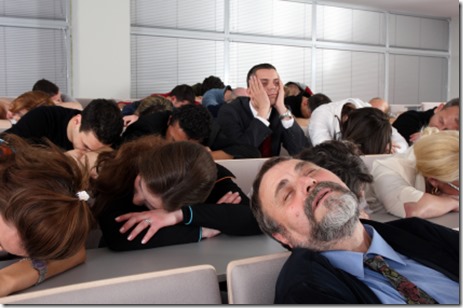Speed Up: How To Stop Being A Slow Talker
Editor’s Note: This is an excerpt from Smart Speaking: 60-Second Strategies For More Than 100 Speaking Problems and Fears by Laurie Schloff and Marcia Yudkin.
If your conversational partner has mentally formulated her five-year business plan by the time you finish a sentence, or if your audience is tapping fingers and feet impatiently while you’re finishing the first paragraph of your talk, it’s safe to say you’re too slow.
A colleague told me he recently walked out of a lecture at a conference and demanded the return of his thirty-five dollar registration fee. The reason? He clocked the speaker at ninety words per minute — about half the average speaking speed.
Some slow talkers do everything at tortoise pace, including speaking. Others take great pain with their speech because they believe everything that comes out of their mouth must be correct, perfectly worded, and significant. It’s admirable to care about what you say, but if you speak too slowly, you may be perceived as boring, tired, or less intelligent than you are. To keep people awake and interested, learn to increase your speaking speech without losing articulation and thought clarity.
1. Learn what makes you slow
Record a one-minute monologue on tape. Use a stopwatch or second hand and listen for the following types of slow spots.
Problem one: Too many words along the way to your point.
“As I was mentioning yesterday when we met with um, ah, Anderson Industries about the takeover negotiations and ah, proceeded to come up with an alternate plan, I told you I’d be getting back you, and so let me introduce our findings by saying…”
Better:
“Let me bring you up to date on our talks with Anderson Industries … “
Problem Two: A generally draggy pace, with both words and pauses drawn out. Audiences prefer an average rate of 180 words per minute or even a little faster.
Problem Three: Pauses that are too frequent or too lengthy. Pauses between sentences should not last much longer than two seconds unless you’re consciously pausing to let information sink in or for dramatic effect.
2. Try These Speed Up Strategies
For Problem One: To practice getting to the point more quickly, ask yourself an opinion question. Using a stopwatch or second hand, give yourself forty-five, then thirty, then twenty seconds to supply an answer. This is a vital skill for any media appearance.
For Problem Two: To pick up the pace, choose a passage from a magazine or book of about 180 words. Practice reading it aloud, seeing how close you can get to finishing it in one minute without sacrificing meaning or clarity.
For Problem Three: Accept that in most situations it is not necessary to deliver a perfectly shaped gem worthy of Bartlett’s Familiar Quotations. Imagine your words pedaling the wheels of a bicycle: if you drop the pace too drastically, you’ll fall over. Practice keeping up momentum while answering questions that you’re posing to yourself for the first time.
This is an excerpt from Smart Speaking: 60-Second Strategies For More Than 100 Speaking Problems and Fears by Laurie Schloff and Marcia Yudkin.





For many years I was involved in explaining why some research using animals is necessary for medical advance.
One of the best advocates I could call on was a very slow talker. He suffered from a debilitating disease but was determined to get his points across. Even the most animated animal rights activist knew better than to cut in when he had not finished a sentence.
Result was Andrew would get 90% of the air time. Which pleased us both enormously.
I am a very fast talker and prefer fast paced conversation. In professional and structured settings it’s fantastic. I get to the point and can move right along.
In social settings it is AWFUL. Why does it take everyone so darn long to think of something to say? I will say something, pause, and when they say nothing, I’ll say something else. I later hear that person called me “annoying” or “rude” because I talk too much.
I’m sorry, but 5-10 seconds to form a response seems like a lifetime to me. I WANT you to talk. I love listening, hearing stories, and learning new things I don’t know. I despise silence. If I’m quiet and they are quiet, I assume they don’t want to talk. When people just hang around in silence I do not know how to process it. I figure, the talking has stopped, you’re still hanging around me so you obviously aren’t trying to get away, you must want me to entertain you.
I then spiral into my one woman stand up routine where I compulsively tell humorous anecdotal stories I think you’ll find funny until I start to lose my voice, or have an appointment.
So, bottom line, if you’re going to take time to form the perfect response, and you realize you’re talking to a fast talker, please indicate that you do wish to say something eventually somehow so I can patiently wait for you to sculpt the perfect comment.
It’s just as rude to call a fast talker annoying when you never indicated you wanted to speak as it is to interrupt someone. That’s my opinion anyways.